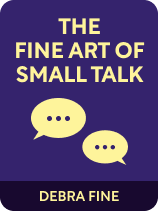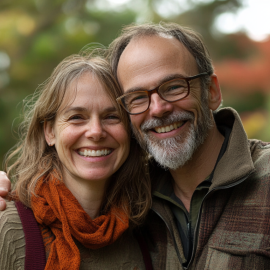

This article is an excerpt from the Shortform book guide to "The Fine Art of Small Talk" by Debra Fine. Shortform has the world's best summaries and analyses of books you should be reading.
Like this article? Sign up for a free trial here .
Do you hate talking about yourself? Why do you need to be willing to open up to others to make a connection?
In her book The Fine Art of Small Talk, Debra Fine says that conversations should be balanced, meaning you can’t just keep asking your partner questions. Thankfully, you don’t have to go into conversations unprepared.
Here is Fine’s advice on how to talk about yourself and tips on how to tell your story.
Prepare Personal Anecdotes
Even if you’ve prepared many questions about the other person, the author says, you’ll eventually have to talk about yourself. You can share your feelings, your opinions about books, restaurants, and movies, or your memories of events and experiences. According to Fine, people will feel resentful if the conversation isn’t balanced, so you need to share as much as you receive. Furthermore, when you talk about yourself, you give others the opportunity to feel connected to you, give them a new topic to speak about, and allow them to share their own related experiences.
(Shortform note: In direct contrast to Fine’s advice, many experts suggest you avoid talking about yourself too much. When you don’t talk about yourself, they say, you listen better—you’re not busy thinking about what to say next. Furthermore, you ask more questions and pay more attention to the answers. To determine whether you need to talk about yourself less or more, ask yourself: Do you already talk about yourself in most conversations? If so, try not talking about yourself for the next two days. If, however, you typically avoid talking about yourself, follow Fine’s suggestions below and try to do so more often.)
Don’t worry that your life isn’t interesting enough to talk about, or about coming across as conceited or self-centered. Fine explains that every ordinary person has experienced something extraordinary; the trick is to look back at your life and pick out the moments that were particularly funny, scary, exciting, or strange. These kinds of events make great conversation material, so prepare a story in advance.
(Shortform note: Fine doesn’t mention that it’s easiest to talk about yourself when you’re talking about what you enjoy doing. Start by making a list of activities that excite you or make you happy. Go down the list and note any interesting, funny, or impressive things that happened in your pursuit of those activities. Did your love of gardening yield strange fruit? Has a camping trip gone amusingly awry? Were you deeply touched by your volunteer work?)
However, Fine warns, only disclose information that’s comfortable and uncontroversial; keep it easy, positive, and light, and match the level of intimacy shared by the other person. Creating friendships is a process of building trust and intimacy over time—revealing your deepest struggles to total strangers will put them off.
(Shortform note: Similarly, avoid criticizing yourself in front of others. For example, don’t say: “I’m kind of stupid,” or, “I’m really awkward,” or, “I’m not good at…” Not only do you tell others to see and treat you that way—as a person who’s stupid, awkward, incapable, and so on—but you also make them uncomfortable. You put pressure on them to comfort or reassure you, or challenge your negativity. People are looking to make friends, not be your therapist.)
Tips for Talking About Yourself
Like Fine, Julie Zhuo—author of The Making of a Manager—says that talking about yourself without being obnoxious is a skill. Here are Zhuo’s tips on how to talk about yourself:
Pay attention to how others respond to you. If you notice a spark in your listener’s eye when you mention where you’re from, don’t just blaze past it; connect with them, and find out why it intrigues them!
Realize that nobody can tell your story as well as you can. Nobody understands your passions, your struggles, and your motivations as well as you do, so take charge of your own narrative. It’s nice when others talk about you, but they can only tell a thin slice of your tale.
Center your stories on “whys.” It can be tempting to describe, in detail, what you’ve done with your life. It’s an easy way to speak at length, but what makes your story unique—and intriguing—is why you did what you did. If you left your hometown, engaged in a particular career, or made a certain choice, talk about why.
Don’t hide what’s great about you for the sake of humility. If an impressive detail about your story naturally emerges from the telling, don’t suppress that. If you’re the VP of Marketing, saying “I’m in sales” doesn’t do you any favors—nor is it the whole truth.
Find authentic, interesting answers to the questions you’re asked most often. For instance, instead of answering a question like “what do you do?” with a short, factual statement, try an anecdote. Consider whether you might have a memory that encapsulates your experience in an interesting way. It’s one thing to say “I’m a plumber,” but chances are you’ve got a few stories about tricky plumbing jobs to tell—so tell one!
Don’t hold back: Share your story. Whoever you are, you’ve got a story that’s yours alone, and it deserves to be heard. Give others a chance to hear and understand you, and to celebrate, commiserate, learn, and connect with you. You’ll find you’re not alone.

———End of Preview———
Like what you just read? Read the rest of the world's best book summary and analysis of Debra Fine's "The Fine Art of Small Talk" at Shortform .
Here's what you'll find in our full The Fine Art of Small Talk summary :
- Why we need small talk and why we shouldn't avoid it
- How to appear confident and engaging in any context
- How to break the ice with strangers and keep the conversation going






